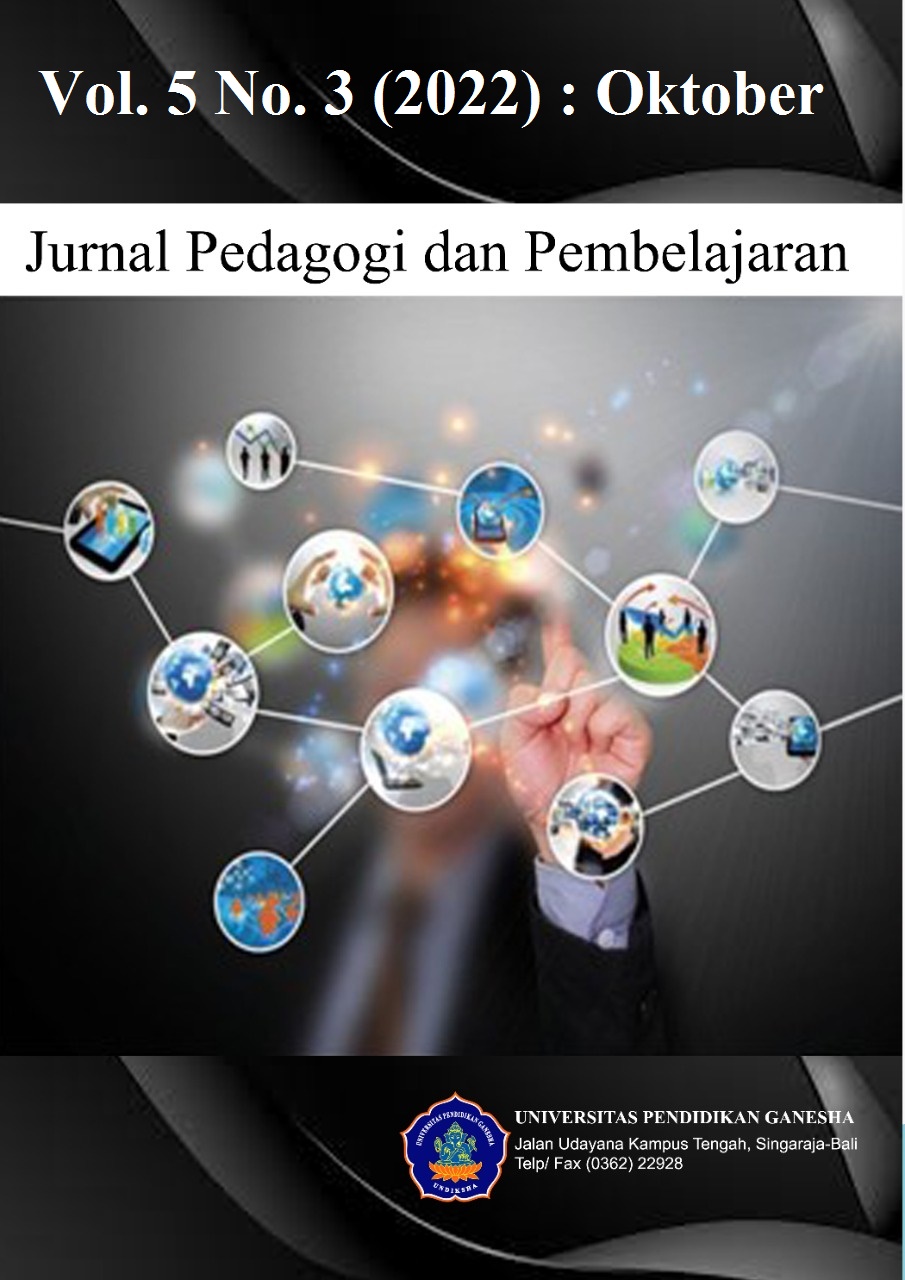Mengembangkan Kemampuan Self-Regulated Learning Bidang Metakognisi
DOI:
https://doi.org/10.23887/jp2.v5i3.44331Keywords:
Pengembangan, Self regulated, MetakognisiAbstract
Kemampuan self-regulated sangat penting untuk dimiliki oleh mahasiswa. Hal ini mencakup perilaku, karena individu mengatur tindakan mereka untuk membuat mereka tetap berfokus pada pencapaian tujuan. Self regulated learning diperlukan oleh mahasiswa untuk dapat menjadikan dirinya pribadi yang bertanggung jawab atas dirinya. Penelitian ini bertujuan untuk menganalisis kebutuhan di lapangan terkait pengembangan self regulated learning dalam metakognisi mahasiswa. Subjek penelitian ini melibatkan 100 mahasiswa dari program studi teknologi pendidikan. Penelitian deskriptif kualitatif ini dilakukan dengan metode survei. Pengumpulan data menggunakan kuesioner. Lembar kuesioner digunakan untuk mengumpulkan data tentang self regulated learning mahasiswa program studi teknologi pendidikan. Analisis data dilakukan secara deskriptif kualitatif dari data penelitian dilakukan. Berdasarkan temuan investigasi yang dilakukan, terlihat bahwa self regulated learning sangat dibutuhkan dalam pembelajaran di tingkat universitas. Mahasiswa membutuhkan pembelajaran yang bisa meningkatkan kemandirian belajar dalam diri mereka serta bisa menjadi pribadi yang jauh lebih baik. Langkah selanjutnya yang diperlukan adalah mengembangkan pembelajaran berbasis self regulated learning untuk mahasiswa teknologi pendidikan.
References
Ainun Fauziah, H., Putri Setyowati, A., Dewantari, R., Dwi Wulandari, A., & Adi Prayitno, B. (2019). Profil Kesadaran Metakognisi Siswa di salah satu SMA Swasta di Sragen. BIOSFER : Jurnal Biologi Dan Pendidikan Biologi, 3(1). https://doi.org/10.23969/biosfer.v3i2.975. DOI: https://doi.org/10.23969/biosfer.v3i2.975
Atmojo, S. E., Muhtarom, T., & Lukitoaji, B. D. (2020). The level of self-regulated learning and self-awareness in science learning in the covid-19 pandemic era. Jurnal Pendidikan IPA Indonesia, 9(4), 512–520. https://doi.org/10.15294/jpii.v9i4.25544. DOI: https://doi.org/10.15294/jpii.v9i4.25544
Bai, B., Shen, B., & Mei, H. (2020). Hong Kong primary students’ self-regulated writing strategy use: Influences of gender, writing proficiency, and grade level. Studies in Educational Evaluation, 65(August 2019). https://doi.org/10.1016/j.stueduc.2020.100839. DOI: https://doi.org/10.1016/j.stueduc.2020.100839
Bakar, N. A., Shuaibu, A., & Bakar, R. A. (2017). Correlation of self-regulated learning and academic achievement among Universiti Sultan Zainal Abidin (UniSZA) undergraduate students. International Journal of Academic Research in Business and Social Sciences, 7(4), 254–268. https://doi.org/10.6007/IJARBSS/v7-i4/2804. DOI: https://doi.org/10.6007/IJARBSS/v7-i4/2804
Balaman, S. (2021). Investigating the relationship between the perception of self-efficacy and the use of self-regulated learning strategies in the English writing skill. RumeliDE Dil ve Edebiyat Araştırmaları Dergisi. https://doi.org/10.29000/rumelide.949696. DOI: https://doi.org/10.29000/rumelide.949696
Balashov, E., Pasicichnyk, I., & Kalamazh, R. (2021). Metacognitive awareness and academic self-regulation of hei students. International Journal of Cognitive Research in Science, Engineering and Education, 9(2), 161–172. https://doi.org/10.23947/2334-8496-2021-9-2-161-172. DOI: https://doi.org/10.23947/2334-8496-2021-9-2-161-172
Berger, J. L., & Karabenick, S. A. (2016). Construct Validity of Self-Reported Metacognitive Learning Strategies. Educational Assessment, 21(1), 19–33. https://doi.org/10.1080/10627197.2015.1127751. DOI: https://doi.org/10.1080/10627197.2015.1127751
Boekaerts, M., & Niemivirta, M. (2000). Self-regulated learning: finding a balance between learning goals and ego-protective goals. Academic Press. DOI: https://doi.org/10.1016/B978-012109890-2/50042-1
Chen, Y.-L., & Hsu, C.-C. (2020). Self-regulated mobile game-based English learning in a virtual reality environment. Computers & Education, 154, 103910. https://doi.org/https://doi.org/10.1016/j.compedu.2020.103910. DOI: https://doi.org/10.1016/j.compedu.2020.103910
Colthorpe, K., Ogiji, J., Ainscough, L., Zimbardi, K., & Anderson, S. (2019). Effect of metacognitive prompts on undergraduate pharmacy students’ self-regulated learning behavior. American Journal of Pharmaceutical Education, 83(4). https://doi.org/10.5688/ajpe6646. DOI: https://doi.org/10.5688/ajpe6646
Dabbagh, N., & Kitsantas, A. (2005). Using web-based pedagogical tools as scaffolds for self-regulated learning. Instructional Science, 33, 513–540. https://doi.org/10.1007/s11251-005-1278-3. DOI: https://doi.org/10.1007/s11251-005-1278-3
Delima, N., & Cahyawati, D. (2021). Students’ Mathematics Self-Concept, Mathematics Anxiety and Mathematics Self-Regulated Learning during the Covid-19 Pandemic. Jurnal Pendidikan Matematika, 15(2), 103–114. https://doi.org/10.22342/jpm.15.2.13200.103-114. DOI: https://doi.org/10.22342/jpm.15.2.13200.103-114
Diandita, E. R., Johar, R., & Abidin, T. F. (2017). Kemampuan Komunikasi Matematis Dan Metakognitif Siswa Smp Pada Materi Lingkaran Berdasarkan Gender. Jurnal Pendidikan Matematika, 11(2), 79–97. https://doi.org/10.22342/jpm.11.2.2533. DOI: https://doi.org/10.22342/jpm.11.2.2533.
Efklides, A. (2011). Interactions of metacognition with motivation and affect in self-regulated learning: The MASRL model. Educational Psychologist, 46(1), 6–25. https://doi.org/10.1016/0361-476X(86)90029-9. DOI: https://doi.org/10.1080/00461520.2011.538645
El-Adl, A., & Alkharusi, H. (2020). Relationships between self-regulated learning strategies, learning motivation and mathematics achievement. Cypriot Journal of Educational Sciences, 15(1), 104–111. https://doi.org/10.18844/cjes.v15i1.4461. DOI: https://doi.org/10.18844/cjes.v15i1.4461
Erlin, E., Rahmat, A., Redjeki, S., & Purwianingsih, W. (2021). Analisis Berbagai Strategi Dan Model Pembelajaran Yang Dapat Memberdayakan Kemampuan Metakognitif Pada Pembelajaran Biologi. Bioed : Jurnal Pendidikan Biologi, 9(2), 30. https://doi.org/10.25157/jpb.v9i2.6383. DOI: https://doi.org/10.25157/jpb.v9i2.6383
Ermin, E. (2021). Analisis Keterampilan Metakognisi Siswa Pada Mata Pelajaran IPA Biologi di SMP Kota Ternate. Jurnal Pendidikan Dan Pembelajaran Indonesia (JPPI), 1(1), 56–60. https://doi.org/10.53299/jppi.v1i1.25. DOI: https://doi.org/10.53299/jppi.v1i1.25
Garcia, R., Falkner, K., & Vivian, R. (2018). Systematic literature review: Self-Regulated Learning strategies using e-learning tools for Computer Science. Computers and Education, 123, 150–163. https://doi.org/10.1016/j.compedu.2018.05.006. DOI: https://doi.org/10.1016/j.compedu.2018.05.006
Harahap, A. C. P. (2020). Covid 19: Self regulated learning mahasiswa. Al-Irsyad, 10(1), 36–42. https://doi.org/10.24176/wasis.v3i1.7503. DOI: https://doi.org/10.30829/al-irsyad.v10i1.7646
Hidayat, D. R., Rohaya, A., Nadine, F., & Ramadhan, H. (2020). Kemandirian Belajar Peserta Didik Dalam Pembelajaran Daring Pada Masa Pandemi Covid -19. Perspektif Ilmu Pendidikan, 34(2), 147–154. https://doi.org/10.21009/pip.342.9. DOI: https://doi.org/10.21009/PIP.342.9
Ikhsan, M., Munzir, S., & Fitria, L. (2017). Kemampuan Berpikir Kritis dan Metakognisi Siswa dalam Menyelesaikan Masalah Matematika melalui Pendekatan Problem Solving. AKSIOMA: Jurnal Program Studi Pendidikan Matematika, 6(2), 234. https://doi.org/10.24127/ajpm.v6i2.991. DOI: https://doi.org/10.24127/ajpm.v6i2.991
Istiqomah, N., & Siswono, T. Y. E. (2020). Pengaruh Pembelajaran Problem Based Learning Terhadap Kemampuan Metakognitif dan Pemecahan Masalah Matematika di Kelas XI SMA Negeri 1 Jombang. MATHedunesa: Jurnal Ilmiah Pendidikan Matematika, 9(2), 422–429. https://doi.org/10.26740/mathedunesa.v9n2.p422-429. DOI: https://doi.org/10.26740/mathedunesa.v9n2.p422-429
Kodri, K., & Anisah, A. (2020). Analisis Keterampilan Metakognitif Siswa Sekolah Menengah Atas dalam Pembelajaran Ekonomi Abad 21 di Indonesia. Edunomic Jurnal Pendidikan Ekonomi, 8(1), 9. https://doi.org/10.33603/ejpe.v8i1.2815. DOI: https://doi.org/10.33603/ejpe.v8i1.2815
Kosnin, A. M. (2007). Self-regulated learning and academic achievement in Malaysian undergraduates. International Education Journal, 8(1), 221–228. https://eric.ed.gov/?id=EJ841762.
McMahon, M., & Oliver, R. (2001). Promoting self-regulated learning in an online environment. Ed-Media 2001 World Conference on Educational Multimedia, Hypermedia & Telecommunications. Association for the Advancement of Computing in Education (AACE).
Musliha, & Revita, R. (2021). Pengaruh Model Pembelajaran Problem Based Learning Terhadap Kemampuan Pemecahan Masalah Matematis Ditinjau dari Self Regulated Learning Siswa. JRPM (Jurnal Review Pembelajaran Matematika), 6(1), 68–82. https://doi.org/10.15642/jrpm.2021.6.1.68-82. DOI: https://doi.org/10.15642/jrpm.2021.6.1.68-82
Musso, M. F., Boekaerts, M., Segers, M., & Cascallar, E. C. (2019). Individual differences in basic cognitive processes and self-regulated learning: Their interaction effects on math performance. Learning and Individual Differences, 71(March), 58–70. https://doi.org/10.1016/j.lindif.2019.03.003. DOI: https://doi.org/10.1016/j.lindif.2019.03.003
Ozer, O., & Akçayoğlu, D. İ. (2021). Examining the roles of self-efficacy beliefs, self-regulated learning and foreign language anxiety in the academic achievement of tertiary efl learners. Participatory Educational Research, 8(2). https://doi.org/10.17275/per.21.43.8.2. DOI: https://doi.org/10.17275/per.21.43.8.2
Panadero, E., Jonsson, A., & Botella, J. (2017). Effects of self-assessment on self-regulated learning and self-efficacy: Four meta-analyses. Educational Research Review, 22, 74–98. https://doi.org/10.1016/j.edurev.2017.08.004. DOI: https://doi.org/10.1016/j.edurev.2017.08.004
Panadero, Ernesto, Klug, J., & Järvelä, S. (2016). Third wave of measurement in the self-regulated learning field: when measurement and intervention come hand in hand. Scandinavian Journal of Educational Research, 60(6), 723–735. https://doi.org/10.1080/00313831.2015.1066436. DOI: https://doi.org/10.1080/00313831.2015.1066436
Peters, M. A. (2017). Technological unemployment: Educating for the fourth industrial revolution. Educational Philosophy and Theory, 49(1), 1–6. https://doi.org/10.1080/00131857.2016.1177412. DOI: https://doi.org/10.1080/00131857.2016.1177412
Retnawati, H. (2016). Proving Content validity of Self Regulated Learning Scale (The Comparison of Aken Index and Expanded Gregory Index). Research and Evaluation in Education, 2(2), 155–164. https://doi.org/10.21831/reid.v2i2.11029. DOI: https://doi.org/10.21831/reid.v2i2.11029
Rokhman, N., Waluya, S. B., & Rochmad. (2019). Individuals development of the metacognitive thinking skills on solving math word problems. Journal of Physics: Conference Series, 1321(2), 1–8. https://doi.org/10.1088/1742-6596/1321/2/022103. DOI: https://doi.org/10.1088/1742-6596/1321/2/022103
Santoso, H. B., Riyanti, R. D., Prastati, T., Susanty, A., & Yang, M. (2022). Learners’ Online Self-Regulated Learning Skills in Indonesia Open University: Implications for Policies and Practice. Education Sciences, 17(7), 469. https://www.mdpi.com/article/10.3390/educsci12070469.
Santoso, Harry B., Lawanto, O., Becker, K., Fang, N., & Reeve, E. M. (2014). High and Low Computer Self-Efficacy Groups and Their Learning Behavior from Self-Regulated Learning Perspective While Engaged in Interactive Learning Modules. Journal of Pre-College Engineering Education Research (J-PEER), 4(2), 10–28. https://doi.org/10.7771/2157-9288.1093. DOI: https://doi.org/10.7771/2157-9288.1093
Septiyani, E., Ramdhan, B., & Juhanda, A. (2020). Profil Kemampuan Metakognitif Siswa Pada Pembelajaran Ipa Kelas Vii Di Smpn 13 Kota Sukabumi. Jurnal Biotek, 8(1), 1. https://doi.org/10.24252/jb.v8i1.13356. DOI: https://doi.org/10.24252/jb.v8i1.13356
Sperling, R. A., Howard, B. C., Staley, R., & DuBois, N. (2004). Metacognition and self-regulated learning constructs. Educational Research and Evaluation, 10(2), 117–139. https://doi.org/10.1076/edre.10.2.117.27905. DOI: https://doi.org/10.1076/edre.10.2.117.27905
Stukalova, O. V. (2017). The system of cultural and creative development of students in the educational environment of higher education institutions in the sphere of culture and art. Revista ESPACIOS, 38(56). http://www.revistaespacios.com/a17v38n56/a17v38n56p33.pdf.
Sutarni, N., Ramdhany, M. A., Hufad, A., & Kurniawan, E. (2021). Self-Regulated Learning And Digital Learning Environment: Effect On Academic Achievement During The Pandemic. Jurnal Cakrawala Pendidikan, 40(2). https://doi.org/10.21831/cp.v40i2.40718. DOI: https://doi.org/10.21831/cp.v40i2.40718
Usman, U. (2014). Aktivitas metakognisi mahasiswa calon guru matematika dalam pemecahan masalah terbuka. Jurnal Didaktik Matematika, 1(2). http://www.e-repository.unsyiah.ac.id/DM/article/view/2074.
van Alten, D. C. D., Phielix, C., Janssen, J., & Kester, L. (2020). Self-regulated learning support in flipped learning videos enhances learning outcomes. Computers and Education, 158(February), 104000. https://doi.org/10.1016/j.compedu.2020.104000. DOI: https://doi.org/10.1016/j.compedu.2020.104000
Wang, C.-H., Shannon, D. M., & Ross, M. E. (2013). Students’ characteristics, self-regulated learning, technology self-efficacy, and course outcomes in online learning. Distance Education, 34(3), 302–323. https://doi.org/10.1080/01587919.2013.835779. DOI: https://doi.org/10.1080/01587919.2013.835779
Wise, A. F., & Hsiao, Y. T. (2019). Self-regulation in online discussions: Aligning data streams to investigate relationships between speaking, listening, and task conditions. Computers in Human Behavior, 96, 273–284. https://doi.org/10.1016/j.chb.2018.01.034. DOI: https://doi.org/10.1016/j.chb.2018.01.034
Zimmerman, B. J. (2002). Becoming a self-regulated learner: An overview. Theory Into Practice, 41(2), 64–70. https://doi.org/10.1207/s15430421tip4102_2. DOI: https://doi.org/10.1207/s15430421tip4102_2
Downloads
Published
How to Cite
Issue
Section
License
Copyright (c) 2022 Andi Kristanto, Hirnanda Dimas Pradana

This work is licensed under a Creative Commons Attribution-ShareAlike 4.0 International License.
Authors who publish with Jurnal Pedagogi dan Pembelajaran agree to the following terms:- Authors retain copyright and grant the journal the right of first publication with the work simultaneously licensed under a Creative Commons Attribution License (CC BY-SA 4.0) that allows others to share the work with an acknowledgment of the work's authorship and initial publication in this journal
- Authors are able to enter into separate, additional contractual arrangements for the non-exclusive distribution of the journal's published version of the work (e.g., post it to an institutional repository or publish it in a book), with an acknowledgment of its initial publication in this journal.
- Authors are permitted and encouraged to post their work online (e.g., in institutional repositories or on their website) prior to and during the submission process, as it can lead to productive exchanges, as well as earlier and greater citation of published work. (See The Effect of Open Access)













